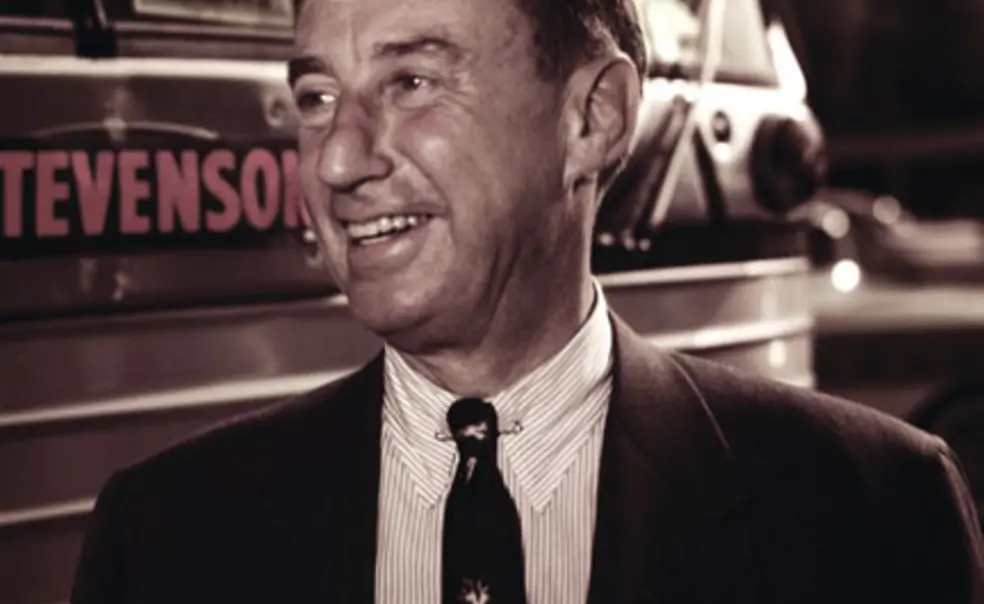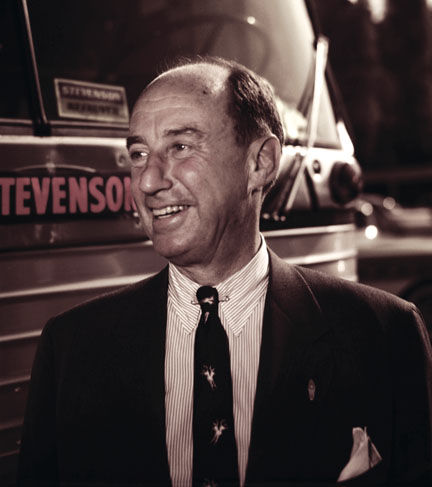Rescuing Stevenson ’22’s name from loserdom
The name of Adlai Stevenson ’22 has been bandied about during this election season, but not always in a good way. Writing in November 2007 at Slate.com, David Greenberg wondered whether Barack Obama, like Stevenson, was simply “another high-toned liberal doomed to failure.” Columnist George F. Will *68 also has drawn the comparison, while history professor Sean Wilentz has suggested that Stevenson, who twice lost the presidency, was “ambivalent about power” and embodied “beautiful loserdom.”
Stevenson defenders, not surprisingly, disagree, and several of them assembled in the Harold Dodds Auditorium of Robertson Hall Sept. 24 for a seminar titled “Adlai Stevenson’s Lasting Legacy,” sponsored by the Woodrow Wilson School.
Far from being an elite egghead out of touch with ordinary citizens, Stevenson loved campaigning and took his responsibilities toward the voters seriously, said his son, former U.S. Sen. Adlai Stevenson III. To Stevenson, democracy was not simply a means to power, but an end in itself and a chance for candidates to inform voters about their positions in a thorough and intelligent way. But he was also a practical and capable administrator. “The egghead,” his son said, “was hard-boiled.”
Stevenson, who won the Democratic presidential nomination in 1952 and 1956 but lost both elections, had a long and distinguished career. As an undergraduate at Princeton, he was managing editor of The Daily Princetonian and a top debater. After earning a law degree from Northwestern, he was elected governor of Illinois, served in the U.S. delegation that helped plan the United Nations, and was U.S. ambassador to the U.N. from 1961 until his death in 1965. At the U.N., he was best remembered for refusing to accept the evasions of Soviet ambassador Valerian Zorin about the presence of offensive missiles in Cuba during the Cuban missile crisis, telling him that the United States was prepared to wait “until hell freezes over” for an answer.
The panelists noted the number of capable people Stevenson brought into government service, including former aides Willard Wirtz, who went on to become secretary of labor, and George Ball, later undersecretary of state. They extolled Stevenson’s wit and erudition, along with his commitment to peace, noting that Stevenson was the first American politician to advocate a nuclear test ban and served as the intellectual father of the New Frontier and Great Society. Henry Bienen, president of Northwestern University and former Wilson School dean, praised Stevenson for his “absence of cant, clear vision, and forward thinking.”
Other panelists, most of whom had known or worked with Stevenson, included former congressman and New York University president John Brademas; former diplomat and World Bank executive A. Edward Elmendorf; senior administrative law judge Alvin Liebling; former U.S. ambassador to the Soviet Union Jack Matlock; former assistant attorney general William vanden Heuvel; and former Princeton dean of student affairs Adele Simmons.













2 Responses
Dorothy Bedford ’78, President, Isabella McCosh Infirmary Auxiliary
10 Years AgoPAW's description incomplete
Your article “Rescuing Stevenson ’22’s name from ‘loserdom’ ” was timely and informative, with one exception: The reference to Adele S. Simmons was offensively incomplete. Please let your readers be aware that she is former president of Hampshire College, former president of the John D. and Catherine T. MacArthur Foundation, and current president of Global Philanthropy Partnership. I thought a typical reference of this sort, Princeton affiliation or not, would cite a person’s most notable position.
Edward A. Woolley ’51
10 Years AgoStevenson '22's work
The Oct. 22 issue included a Notebook report on a seminar focusing on Adlai Stevenson ’22. One of his influences was on local politics in New York City. Many young people were so inspired by his principled, intellectual, and practical approach to politics that they began a series of “reform” political clubs such as the Lexington Democratic Club on the East Side, the Village Independent Democrats in Greenwich Village, and many on the West Side. The goal was to throw out the Tammany Hall politicians and change the local Democratic party to nominate candidates of merit and promise. Eventually it succeeded in electing many party and public officeholders, including Mayor Ed Koch. It was a privilege to work for these goals and to see the results of hard work and commitment to principle.